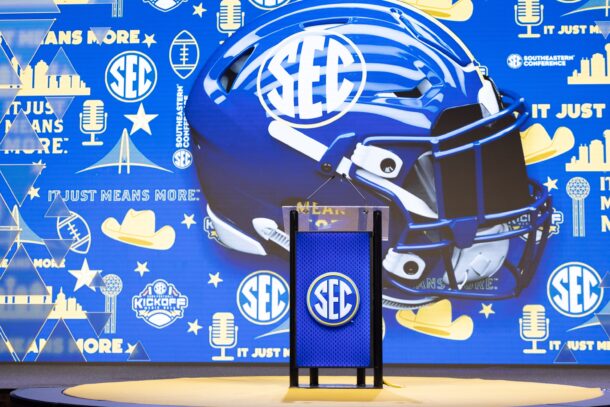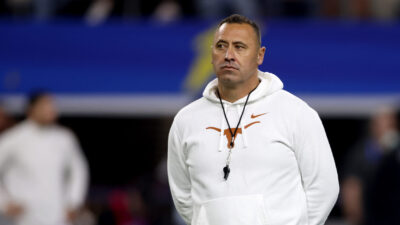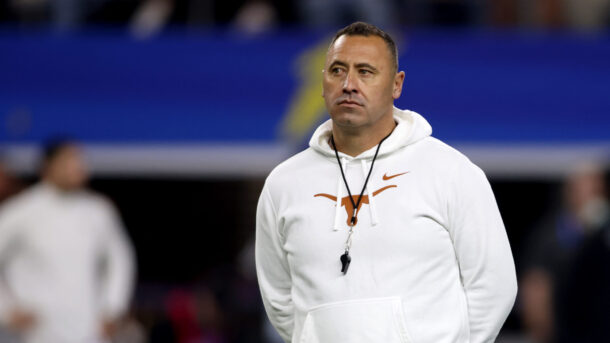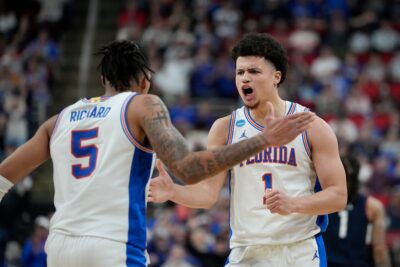Ad Disclosure
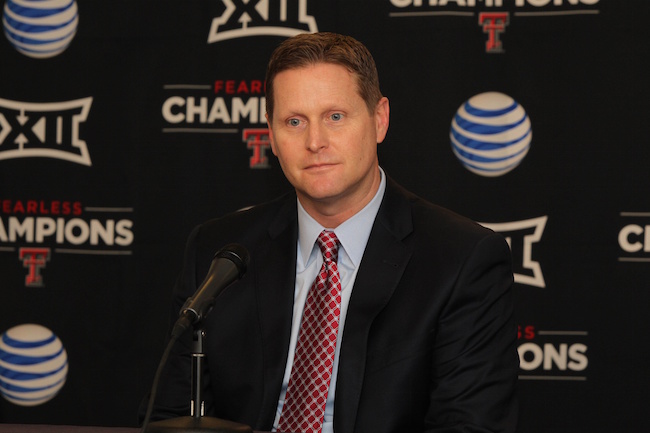
Profiling the current College Football Playoff selection committee
By Jessi Lee
Published:
Every ranking system has its flaws.
The AP Poll consists of votes compiled by sportscasters and sports writers, and the voters are not required to have a history of playing football, nor is their objectivity checked.
The Coaches Poll is just that: A ranking built by the voting of coaches. And there’s no way to fully remove the bias of coaches as they vote.
Then there’s the Bowl Championship Series Poll. The BCS Poll was expected to cut down on bias, but it created problems of its own. Rankings were determined by a computer system that considered a number of factors: The average rankings from other polls, every team’s W-L record, strength of schedule and margin of victory.
However, a computer system cannot compare a loss in Week 1 to a loss in Week 10. It cannot take into consideration that a key player was suspended or injured in a game. It cannot contemplate whether a No. 9 team should have been there in the first place, much less whether a win over that team is as impressive as it first seemed.
The BCS ranking system made mistakes. College football fans nationwide called for a playoff system similar to the NFL playoffs or March Madness. And so the College Football Playoff system was born.
So how can we take the best of human polls and computerized rankings? We built a committee of professionals from different backgrounds, but all with the necessary skills and experience, and we have them consider each and every factor.
The College Football Playoff committee was designed to include 13 members to allow for a wide range of viewpoints without sacrificing the ability to come to timely decisions.
The primary responsibility of the selection committee is to rank the top four teams and assign the to semifinal playoff games. But they are also responsible for ranking the next eight teams and assigning them to New Year’s Six bowls and ensuring the matchups are competitive and attractive. And, yes, geography is a consideration for bowl selection.
In order to rank the FBS teams, the committee must consider strength of schedule, head-to-head competition, conference standing and outcomes when teams play common opponents. The committee is also free to consider off-the-field factors that have and may continue to affect the team’s performance.
Don’t be fooled into thinking the committee has it easy. The voting process is an arduous task. Aside from what criterion each committee member considers when ranking his or her own Top 25, the group has to come to an agreement on the official Top 25.
The voting process begins with each member listing the best 25 teams, in no particular order. Then each member’s list is reviewed, and any teams included on three or more members’ lists move to the next round. We’ll call this Step 1.
From those teams that have moved forward, each member will the list the best six teams, in no particular order. Again, the lists are reviewed, and the six teams with the most votes continue down the line. This will be Step 2.
Members then rank the six surviving teams Nos. 1 though 6, with each ranking holding an identical point value. The three teams with the fewest points are locked into the top three spots, and they will not be voted on again for that week. Alas, this is Step 3.
Of the remaining teams — including the three teams in the bottom half of the top six rankings — the committee members will repeat Steps 2 and 3 until all 25 slots are filled, three teams at a time.
And if that doesn’t sound difficult enough, keep in mind that this process has to be completed each week with no consideration of the previous week’s Top 25.
The task is not to be taken lightly, so the selection of the committee members is not taken lightly either. The members of the selection committee are chosen based on six primary criterion:
- Integrity – First and foremost, each candidate must possess a character of integrity before he or she is considered for the committee. There’s no room for ulterior motives and corruption in the CFP Administration.
- Experience – The management committee only considers candidates with experience as coaches, student-athletes, administrators, journalists or directors of athletics.
- Expertise – This goes hand-in-hand with experience. Members of the selection committee need to actually have knowledge and expertise in the area of football. The expertise can be in the role of a player, coach, director, reporter, etc.
- Objectivity – Objectivity is especially important in the voting process. Members of the selection committee need to be able to put away bias of certain players, coaches, teams, locations, etc. There is also a recusal process in place that prevents any member who is receiving financial compensation from a school from voting or discussing the school’s merit beyond factual questions.
- Decision-Making Ability – There is a lot of pressure on the selection committee to get the rankings right. So the members must be able to objectively view the information and make the right decisions regardless of the pressure and scrutiny from the outside.
- Time – It’s hard enough to catch all of the games live on TV, so the members of the selection committee are not expected to physically attend the games. They are, however, responsible for watching a great deal of film. A lot of time must be devoted to this process in order to do it correctly.
Each selection committee includes an elected chair. The chair is responsible for ensuring the other members can work together, setting the meeting agenda, leading and driving the meetings and speaking to the public. If a member is selected as the chair in his or her final year with the committee, an additional year of eligibility may be added.
That brings us to how the terms and rotations work for the members of the selection committee. Ultimately, each member is supposed to serve a single three-year term, and the terms will be served on a staggered basis. However, in order to get things started and get the rotation set up, some members will serve shorter or longer terms in these first few years.
So far, each member who has left the committee has done so for their own reasons, but beginning in February of next year, the staggering will begin. The first members to complete their terms will be Kirby Hocutt, Barry Alvarez, Bobby Johnson and Condoleezza Rice.
In February 2018, the terms will be up for Tom Jernstedt, Jeff Long, Dan Radakovich, Steve Wieberg and Tyrone Willingham. In February 2019, the terms will be up for Jeff Bower, Lloyd Carr, Herb Deromedi and Rob Mullens.
All newly chosen committee members after February 2016 will serve the planned three-year terms.
Most of the current members of the selection committee have been around from the beginning, but there were a few changes.
- Jeff Long, Chair
- Barry Alvarez
- Mike Gould
- Pat Haden
- Tom Jernstedt
- Oliver Luck
- Archie Manning
- Tom Osborne
- Dan Radakovich
- Condoleezza Rice
- Mike Tranghese
- Steve Wieberg
- Tyrone Willingham
- Jeff Long, Chair
- Barry Alvarez
- Mike Gould
- Pat Haden
- Kirby Hocutt
- Tom Jernstedt
- Bobby Johnson
- Tom Osborne
- Dan Radakovich
- Condoleezza Rice
- Mike Tranghese
- Steve Wieberg
- Tyrone Willingham
In 2014, Archie Manning left before being recused for his affiliation with Ole Miss. In 2015, Pat Haden left the committee amidst health concerns. Here’s a look at who made the cut for the 2016 season and why:
KIRBY HOCUTT, CHAIR
Pedigree: Director of athletics, Texas Tech University (2011 to present)
Résumé: Hocutt spent four years as a linebacker for Kansas State before heading to Oklahoma to get his master’s degree and serve as the associate athletics director. He also served as the athletics director for Ohio State and Miami before landing the spot at Texas Tech. The 2016 season will be his first as committee chair.
BARRY ALVAREZ
Pedigree: Director of athletics, University of Wisconsin (2004 to present); Former head coach, University of Wisconsin (1990-2005, 2012)
Résumé: Alvarez has become a household name in Madison, Wis. He is the winningest coach in the school’s history, and as the athletics director, he can claim 16 national titles and 37 conference titles across multiple sports. And did we mention he’s a member of the College Football Hall of Fame?
JEFF BOWER
Pedigree: Former head coach, University of Southern Mississippi (1990-2007)
Résumé: After winning the Conference USA Coach of the Year three times, Bower was then named Conference USA Coach of the Decade. In his 18 years at Southern Mississippi, he led the team to four conference titles and 14 consecutive winning seasons.
LLOYD CARR
Pedigree: Former head coach, University of Michigan (1995-2007)
Résumé: Another member of the College Football Hall of Fame, Carr is also one of the winningest coaches in Michigan’s history. He has collected an impressive number of coaching awards, which is no surprise when you consider he led the Wolverines to five conference championships, six bowl victories and a shot at the national title.
HERB DEROMEDI
Pedigree: Former director of athletics, University of Central Michigan (1994-2006); Former head coach, University of Central Michigan (1978-1983)
Résumé: Deromedi spent 38 years with Central Michigan as an assistant coach, head coach and athletics director. Twice, he was named the MAC Coach of the Year, and when he retired, he was the winningest coach not just in school history but also in conference history. His accomplishments at Central Michigan earned him a place in the College Football Hall of Fame.
TOM JERNSTEDT
Pedigree: Former NCAA Executive Vice President (2003-2010)
Résumé: Jernstedt spent four years on scholarship with the Ducks before serving the university in three different athletic administration positions. He then joined the Board of Directors for the U.S. Collegiate Sports Council, working his way up to the role of vice president. His career with the NCAA lasted a whopping 38 years.
BOBBY JOHNSON
Pedigree: Former head coach, Vanderbilt University (2002-2010); Former head coach, Furman University (1994-2001
Résumé: Johnson bounced back and forth between Clemson and Furman for more than 30 years before landing at Vanderbilt. As a player, he collected academic all-conference honors. He also collected a number of awards throughout his coaching career.
JEFF LONG
Pedigree: Vice chancellor and director of athletics, University of Arkansas (2008-present); Former director of athletics, University of Pittsburgh (2003-2007)
Résumé: There’s no question as to why Long was chosen as the chair for the first and second selection committees. He has spent 35 years as an athlete, coach or administrator in FBS, FCS and Division II football. In the FBS alone, he spent time with nine separate schools. The sheer number of positions listed on his Résumé might be cause for concern if each change wasn’t a promotion in its own right.
ROB MULLENS
Pedigree: Director of athletics, University of Oregon (2010-present); Former deputy director of athletics, University of Kentucky (2006-2010)
Résumé: Mullens spent his entire career on the East Coast at schools like Maryland, West Virginia, Kentucky and Miami before taking the trip to Oregon to become the athletics director for the school’s most successful era. Unlike many of the other names on this list, Mullens’ background isn’t as an athlete but as a businessman.
DAN RADAKOVICH
Pedigree: Director of athletics, Clemson University (2012-present); Former director of athletics, Georgia Tech (2006-2012)
Résumé: Like Long, Radakovich has spent a huge chunk of time — 30 years — as an athlete, coach or administrator. His playing career at Indiana University of Pennsylvania encompassed time at tight end and punter. He also coached at his alma mater as a student. Five of his athletic administration positions were at FBS schools, and two more were at FCS schools. Like Mullens, Radakovich also has an extensive background in business, specifically financial management.
CONDOLEEZZA RICE
Pedigree: Former provost, Stanford University (1993-1999)
Résumé: Rice’s resume outside of college football arguably is the most impressive. She’s the former Secretary of State and the former National Security Advisor, and she has been named one of the most powerful and influential people by a number of organizations throughout the years. But before she became nationally known in our nation’s capital, she was a professor and then provost of Stanford University. She also served on the board of directors for her alma mater Notre Dame.
STEVE WIEBERG
Pedigree: Former college football reporter, USA Today (1982-2012)
Résumé: Wieberg was part of the team that founded USA Today back in 1982. In his time there, he covered eight Summer and Winter Olympics, three MLB World Series, 18 college football championship games and 30 NCAA Final Four. The number of journalism awards he has won won’t fit on a single page. He left USA Today in 2012 in favor of a quieter life at the Kansas City Public Library, but that has in no way diminished his knowledge of the game.
TYRONE WILLINGHAM
Pedigree: Former head coach, University of Washington (2005-2008); Former head coach, University of Notre Dame (2002-2004); Former head coach, Stanford University (1995-2001)
Résumé: Willingham has spent 36 years as either a player or coach for seven FBS schools, one FCS school and one NFL organization. On paper, 2002 — his first year as head coach of the Fighting Irish — was his best year, when he was awarded multiple coaching honors. He retired in 2008, but he has been volunteering for a number of organizations since then.
THE COMMITTEES BEHIND THE COMMITTEE
Have you ever wondered how the committee is chosen?
There are actually two committees above the selection committee.
You must first understand that the College Football Playoff is a company: The CFP Administration, LLC. And within the company there are two committees that oversee selection committee. The first of these is the Board of Managers. The board is made up of university presidents and chancellors, and it handles the property, budgets, policies, procedures and the hiring and firing of officers within the CFP Administration.
The second of these is the Management Committee. This committee is made up of each FBS conference commissioner and the Notre Dame director of athletics. The committee handles the day-to-day operations of the business, and it selects who serves on the Selections Committee.
The management committee also chooses the chair of the selection committee, according to the official website, although the selection committee independently made the decision to elect Long in in 2015.
Board of Managers
- Max Nikias, Chair of the Board – President of University of Southern California
- Rodney Bennett – President of University of Southern Mississippi
- Anthony Frank – President of Colorado State University
- Burns Hargis – President of Oklahoma State University
- Jack Hawkins – Chancellor of Troy University
- Reverend John Jenkins – President of University of Notre Dame
- Mark Keenum – President of Mississippi State University
- Roderick McDavis – President of Ohio University
- Harvey Perlman – Chancellor of University of Nebraska
- John Thrasher – President of Florida State University
- Stedman Upham – President of University of Tulsa
Management Committee
- Mike Aresco – American Athletic Conference
- Karl Benson – Sun Belt Conference
- Bob Bowlsby – Big 12
- Jim Delany – Big Ten
- Judy MacLeod – Conference USA
- Greg Sankey – Southeastern Conference
- Larry Scott – Pac-12
- John Steinbrecher – Mid-American Conference
- John Swofford – Athletic Coast Conference
- Craig Thompson – Mountain West Conference
- Jack Swarbrick – Notre Dame (athletics director)
